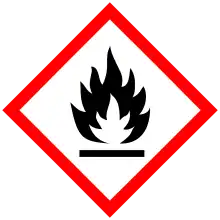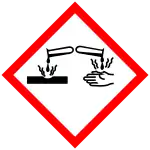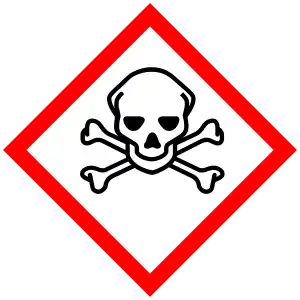腐胺
腐胺(putrescine),又称1,4-丁二胺(1,4-diaminobutane,亦簡稱丁二胺)、1,4-二氨基丁烷(1,4-butanediamine)、四亚甲基二胺(Tetramethylenediamine)或腐肉碱,是一种有机化合物,常温下为无色晶体或无色至微黄色液体。腐胺的分子式为NH2(CH2)4NH2。
| 腐胺 | |
|---|---|
 | |
| IUPAC名 Butane-1,4-diamine | |
| 别名 | 1,4-丁二胺、1,4-二胺基丁烷 |
| 识别 | |
| CAS号 | 110-60-1 |
| PubChem | 1045 |
| ChemSpider | 13837702 |
| SMILES |
|
| Beilstein | 605282 |
| Gmelin | 1715 |
| 3DMet | B00037 |
| UN编号 | 2928 |
| EINECS | 203-782-3 |
| ChEBI | 17148 |
| RTECS | EJ6800000 |
| DrugBank | DB01917 |
| KEGG | C00134 |
| MeSH | Putrescine |
| IUPHAR配体 | 2388 |
| 性质 | |
| 化学式 | C4H12N2 |
| 摩尔质量 | 88.15 g·mol−1 |
| 外观 | 無色晶體 |
| 氣味 | 刺鼻腥味 |
| 密度 | 0.877 g/mL |
| 熔点 | 27.5 °C(301 K) |
| 沸点 | 159 °C(431.7 K) |
| 溶解性(水) | 混溶 |
| log P | −0.466 |
| 蒸氣壓 | 2.33 mm Hg(25°C,估計值) |
| kH | 3.54x10−10 atm-cu m/mol(25°C,估計值) |
| 折光度n D |
1.457 |
| 危险性 | |
GHS危险性符号   | |
| GHS提示词 | DANGER |
| H-术语 | H228, H302, H312, H314, H331 |
| P-术语 | P210, P261, P280, P305+351+338, P310 |
| 爆炸極限 | 0.98–9.08% |
| 致死量或浓度: | |
LD50(中位剂量) |
|
| 相关物质 | |
| 相关化合物 |
|
| 相关化学品 |
|
| 若非注明,所有数据均出自标准状态(25 ℃,100 kPa)下。 | |
腐胺与尸胺一样,都是生物活体或尸体中蛋白质的氨基酸降解产生。[1][2]这两种化合物是腐败物质散发的恶臭气体的主要成分,是口气、细菌性阴道炎等疾病病变部位产生的气味的原因。腐胺、尸胺及其它一些如精胺、亚精胺分子也被在精液和一些微生物如微藻中发现。
生产
生化作用
多胺的生成中,腐胺与S-腺苷甲硫氨酸脱羧后产生的S-腺苷-3-甲硫基丙胺反应,并产生亚精胺。亚精胺反过来与其他S-腺苷-3-甲硫基丙胺,将其转化为精胺。

亚精胺生物合成

精胺生物合成
在生物体内,鸟氨酸脱羧酶的作用下鸟氨酸脱羧能降解,产生少量的腐胺。多胺类化合物(腐胺是其中具有最简单结构的一种),可能是细胞分裂过程中所必须的一类生长因子。

另見
- 名稱獨特的化學物質列表
参考
- Lewis, Robert Alan. . CRC Press. 1998: 212. ISBN 1566702232.
- Kamhi, Ellen,Ph.D.,RN,HNC. . Celestial Arts. 2007: 14. ISBN 1587612593.
鸟氨酸可由肠道细菌转化为有毒的腐胺,而腐胺最终会被降解成其他多胺,如亚精胺、精胺及尸胺。(Ornithine is converted by bowel bacteria into a toxic substance called putrescine, which in turn degrades into polyamines, such as spermadine, spermine, and cadaverine literally meaning "the essence of dead cadavers")。
- Brief biography of Ludwig Brieger 的存檔,存档日期2011-10-03. (in German). Biography of Ludwig Brieger (页面存档备份,存于) in English.
- Ludwig Brieger, "Weitere Untersuchungen über Ptomaine" [Further investigations into ptomaines] (Berlin, Germany: August Hirschwald, 1885), page 43. From page 43: Ich nenne dasselbe Putrescin, von putresco, faul werden, vermodern, verwesen. (I call this [compound] "putrescine", from [the Latin word] putresco, to become rotten, decay, rot.)
- Ludwig Brieger, "Weitere Untersuchungen über Ptomaine" [Further investigations into ptomaines] (Berlin, Germany: August Hirschwald, 1885), page 39.
- . 7th Ed. [2007-09-10]. (原始内容存档于2020-04-10).
- . [2007-09-10]. (原始内容存档于2007-10-10).
- . [2010-04-18]. (原始内容存档于2019-09-16).
This article is issued from Wikipedia. The text is licensed under Creative Commons - Attribution - Sharealike. Additional terms may apply for the media files.